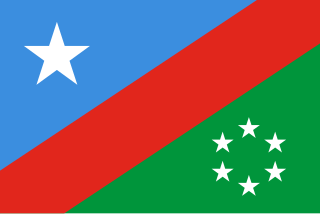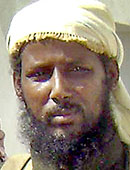| |||||
| Decades: | |||||
|---|---|---|---|---|---|
| See also: | |||||
The following lists events that happened during 2014 in Somalia .
| |||||
| Decades: | |||||
|---|---|---|---|---|---|
| See also: | |||||
The following lists events that happened during 2014 in Somalia .

The South-West State of Somalia (Somali: - Koonfur Galbeed),, is a Federal Member State in southwestern Somalia. It was founded by Hasan Muhammad Nur Shatigadud, leader of the Somalia RRA on 1 April 2002. It was the third autonomous region to be established.

The Somali Football Federation (SFF), was founded in 1951, and it is one of the national administrative governing bodies of the Confederation of African Football (CAF) responsible for organizing and controlling the sport of football and its competitions in the Federal Republic of Somalia, they also manage the Somalia national football team. In 1962, the SFF became a FIFA member. It later joined CAF in 1968, and the Union of Arab Football Associations (UAFA) in 1974. The SFF is responsible for organizing matches between local teams and enforcing rules and regulations of the game during matches.

Sharif Sheikh Ahmed is a Somali politician who served as the 7th President of Somalia from 2009 to 2012. Before his presidency, he led the Islamic Courts Union (ICU) from 2004 to 2007, a coalition of Sharia courts aiming to restore law and order in Somalia.

The Transitional Federal Government (TFG) was internationally recognized as a provisional government of the Somalia from 14 October 2004 until 20 August 2012, when its tenure officially ended and the Federal Government of Somalia (FGS) was inaugurated.

Sheikh Mukhtar Robow, also known as Abu Mansur, is a former deputy leader and former spokesman of the Somali militant group Al-Shabaab. In 2015, he defected from Al-Shabaab due to ideology issues after years of hiding in his hometown. In 2022, Robow was appointed as the Minister of Religious Affairs in the Somali government.

Somalia–United States relations are bilateral relations between the Federal Republic of Somalia and the United States of America. Somalia has an embassy in Washington, D.C., and the United States maintains an embassy in Mogadishu which was reopened in late 2019.

The Somali Civil War (2009–present) is the ongoing phase of the Somali Civil War which is concentrated in southern and central Somalia. It began in late January 2009 with the present conflict mainly between the forces of the Federal Government of Somalia assisted by African Union peacekeeping troops and al-Shabaab militants who pledged allegiance to al-Qaeda during 2012.

Hizbul Islam, also known as Hizbul Islaami, Hisbi Islam, or Hezb-ul Islam, was a Somali Islamist group formed after four Islamist groups merged to oppose the new Transitional Federal Government administration of President Sheikh Sharif Ahmed several weeks after end of the Ethiopian military occupation of Somalia.

Omar Abdirashid Ali Sharmarke, popularly known as Omar Sharmarke, is a Somali diplomat and politician. From 2009 to 2010, he was the Prime Minister of Somalia. He subsequently briefly served as Somalia's Ambassador to the United States in 2014. In December 2014, Sharmarke was reappointed Prime Minister of Somalia. His term ended on 1 March 2017, and he was replaced by Hassan Ali Khaire.

Corruption in Somalia pertains to purported levels of corruption within Somalia's public and private sectors according to official metrics, anti-graft measures aimed at addressing those issues, as well as political dispensations and structural changes in government affecting transparency. Owing to a reported lack of accountability in the receipt and expenditure of public funds by the Transitional Federal Government, a federal Anti-Corruption Commission was put into place in 2011 so as to deter and eliminate graft. On Transparency International's 2023 Corruption Perceptions Index, Somalia scored 11 on a scale from 0 to 100. When ranked by score, Somalia ranked last among the 180 countries in the Index, where the country ranked first is perceived to have the most honest public sector. For comparison with worldwide scores, the best score was 90, the average score was 43, and the worst score was Somalia's, 11. For comparison with regional scores, the average score among sub-Saharan African countries was 33. The highest score in sub-Saharan Africa was 71 and the lowest score was Somalia's, 11.
The Federal Government of Somalia is the internationally recognised government of Somalia, and the first attempt to create a central government in Somalia since the collapse of the Somali Democratic Republic. It replaced the Transitional Federal Government (TFG) of Somalia on 20 August 2012 with the adoption of the Constitution of Somalia.

The Federal Parliament of Somalia is the national parliament of Somalia. Formed in August 2012, it is based in the capital Mogadishu and is bicameral, consisting of an Upper House (Senate) and a Lower House.

Hassan Sheikh Mohamud is a Somali politician serving as the current president of Somalia since 15 May 2022. He previously held the office from 2012 to 2017.

Mohamed Sheikh Hassan Hamud is a Somali politician. He is the former Chief of the Somali Police Force.
Mustaf Ali Duhulow is a Somali politician. He served as the Minister of Information of Somalia from January 2014 to January 2015.

Said Abdullahi Deni, also known as Said Deni, is the current president of Puntland. He was first elected on January 8, 2019. Five years later February 8, 2024 he was reelected

The Daljir Party was a liberal political party in Somalia. It developed from the tradition of socially conservative Islamism, but officially abandoned this ideology in favour of "conservative democracy".

Indirect presidential elections were held in Somalia on 8 February 2017. Members of parliament elected in the autumn-2016 parliamentary election elected former Prime Minister Mohamed Abdullahi Mohamed to the post of President of Somalia for a four-year term.

Presidential elections were held in Somalia in 15 May 2022. The election was held indirectly and after the elections for the House of the People, which began on 1 November 2021 and ended on 13 April 2022.
The 2021–2022 Somali political crisis was a major political crisis and turmoil within the Somali government after President Mohamed Abdullahi Mohamed's term ended on 8 February 2021. Parliamentary elections held during 2021, but were not completed during the year. Prime Minister Mohamed Hussein Roble opposed the president's decision, and called for him to step down. Following months of protests, a deal was struck in January 2022 to hold elections in February. After a delay, presidential elections were ultimately held in May which resulted in President Mohamed Abdullahi Mohamed losing his bid for reelection to Hassan Sheikh Mohamud.